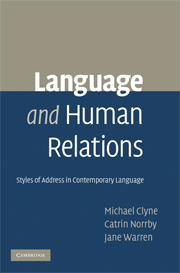Book contents
- Frontmatter
- Contents
- List of tables and figure
- List of abbreviations and transcription conventions
- Acknowledgements
- 1 Introduction
- 2 Multiple approaches for a complex issue
- 3 Contextualising address choice
- 4 Institutions, domains and medium
- 5 National variation
- 6 Conclusions
- Appendix A
- Appendix B
- References
- Index
6 - Conclusions
Published online by Cambridge University Press: 04 July 2009
- Frontmatter
- Contents
- List of tables and figure
- List of abbreviations and transcription conventions
- Acknowledgements
- 1 Introduction
- 2 Multiple approaches for a complex issue
- 3 Contextualising address choice
- 4 Institutions, domains and medium
- 5 National variation
- 6 Conclusions
- Appendix A
- Appendix B
- References
- Index
Summary
Introduction
This chapter summarises the findings of the study and proposes a model for choice of address mode. This is based on grammatical and pragmatic comparisons between the languages, the address preferences of individuals or networks, contextual factors and a set of six principles of address mode choice focusing on degree of social distance.
In this study, we have focused on three languages, French, German and Swedish. They share quite similar pronominal resources for address, namely a binary system in at least the singular (in the case of German, in the plural too). The fourth language, English, which we have considered in a more peripheral way as a point of reference, does not offer a binary pronominal system of address. However, it has shown how nominal features (notably FN vs. hon [with or without title] + LN, but also V-like modes of address Sir, Madam and T-like ones such as mate, dear) can fulfil similar functions as the pronominal modes in the other languages. How linguistic resources such as pronouns are utilised pragmatically to manage human relations is informed by cultural and/or sub-cultural values and social structures as well as by contextual factors, all subject to sociopolitical change. This means that the same grammatical devices can be used quite differently across and within languages. In French, and to a large extent in German, the pronouns T and V drive the entire address system; T is linked with FN (or kinship term) and V with hon (and/or title) and LN.
- Type
- Chapter
- Information
- Language and Human RelationsStyles of Address in Contemporary Language, pp. 154 - 163Publisher: Cambridge University PressPrint publication year: 2009



